Best generators
Here are the best portable generators for home use, work, or as a backup for power outages.
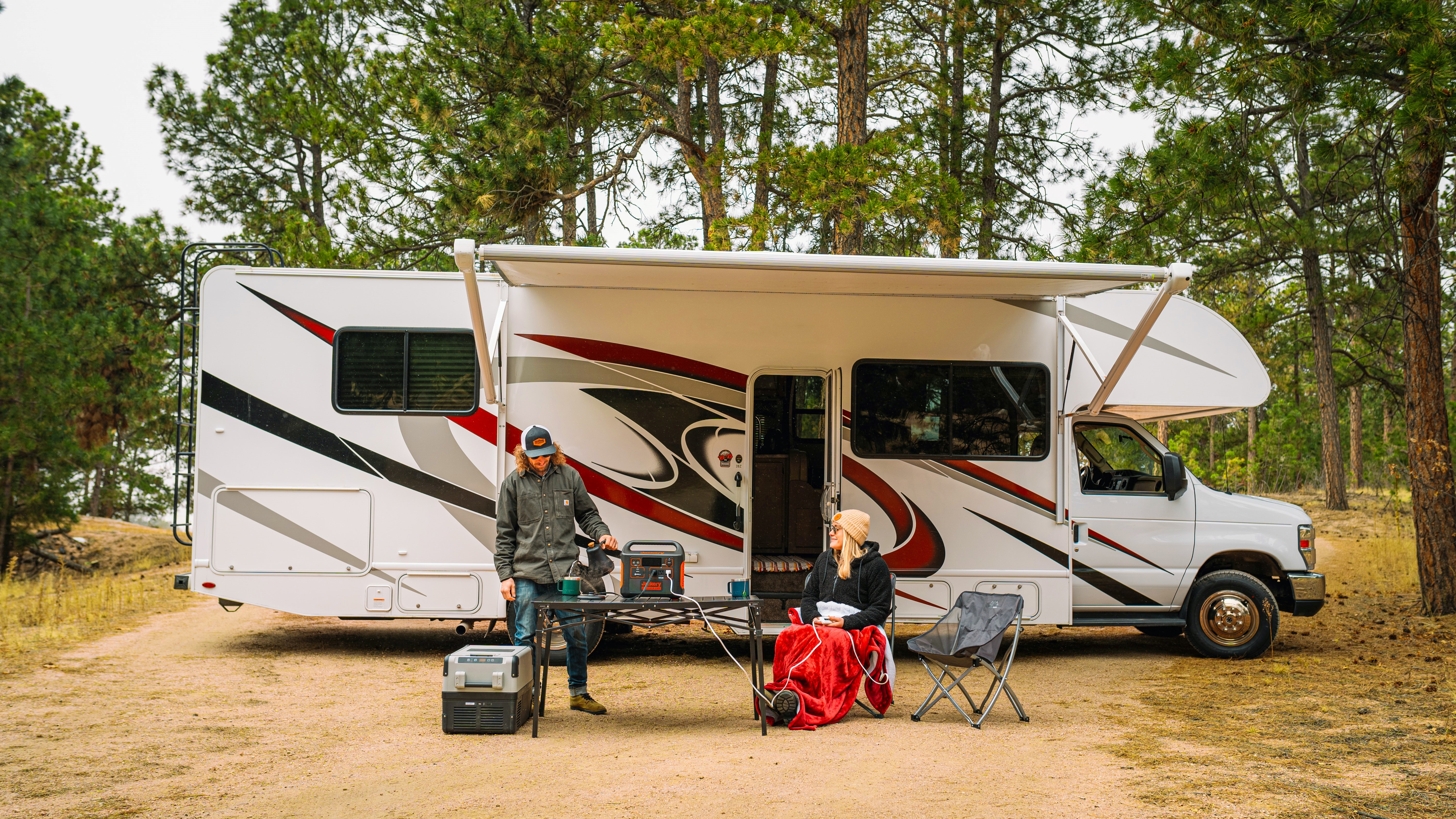
Sign up to receive the latest news, reviews, buying guides and deals direct to your inbox
You are now subscribed
Your newsletter sign-up was successful
Whether you find yourself in an emergency situation, or like a little more oomph while camping, a generator is a handy tool to have. Generators and usually pretty bulky and heavy, and there are different types designed depending on if you need to power up household appliances or charge electronic devices. Here are the best gas and battery-powered options along with some helpful information on how to choose a generator for your specific need.
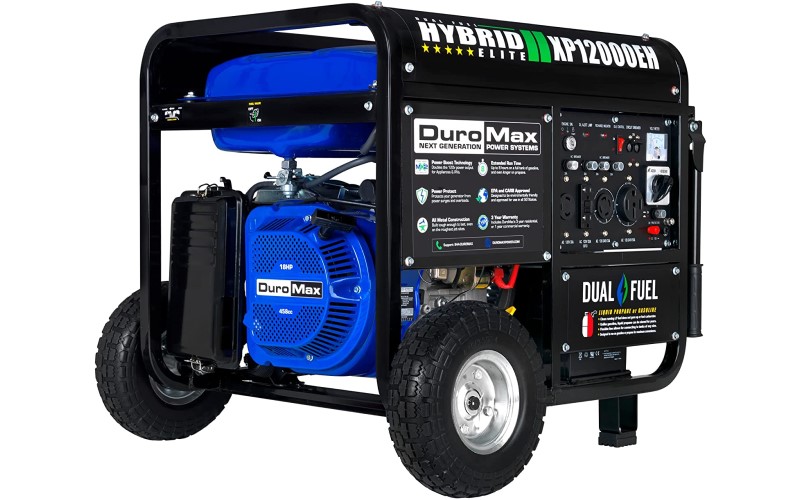
DuroMax XP12000EH generator
Handles appliances and power tools
The DuroMax XP12000EH generator gives you 12,000 watts of running power. This is the one you need for your home if the power is off because it handles appliances like refrigerators and home air conditioners.
Pros:
- Impressive power
- Safe for large appliances
- Runs on either propane or gas
Cons:
- Heavy
- Loud
- Not for charging electronics
- Wheels are plastic
It’s gas-powered and quite noisy, but it does have a built-in starter motor rather than a pull cord. It also works with propane. The DuroMax isn’t an inverter generator, so don’t get this if you’re looking for something to power sensitive electronics like laptops, tablets, or phones. Depending on the size of the tank you use, you will get a decent number of hours of power before needing to change the tank. For BBQ-sized propane tanks, you can expect about 4 hours of power. If you fill the gas tank, you can get up to 12 hours of power depending on what you're running. Also, the wheels that come with this unit are mostly made from plastic. After holding over 200 pounds, they are prone to going flat quickly. You can purchase different, more sturdy wheels to attach to the generator.
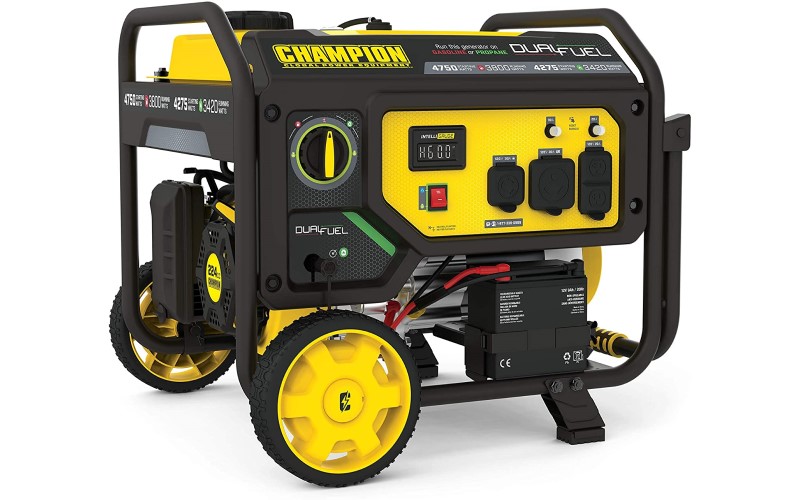
Champion Power Equipment dual fuel generator
Power in the great outdoors
The Champion Power Equipment generator produces up to 3,800 running watts. It has all the outlets for powering an RV and handles basic items like small televisions, air compressors, and even some power tools.
Pros:
- Hours of power
- Uses gas or propare
- Lots of outlets
- Invertor makes it safe to charge electronics
Cons:
- Heavy
The Champion can run continually for 14 hours with gas or over 10.5 hours with propane when full. It has an inverter that is great for keeping devices like smartphones and tablets safely charged. It’s a pretty heavy machine, around 119 pounds, but it's on wheels that make it portable and easier to move around. But being large means it offers enough outlets to keep everything up and running at once without too much of a sacrifice or strain on its power outlet.
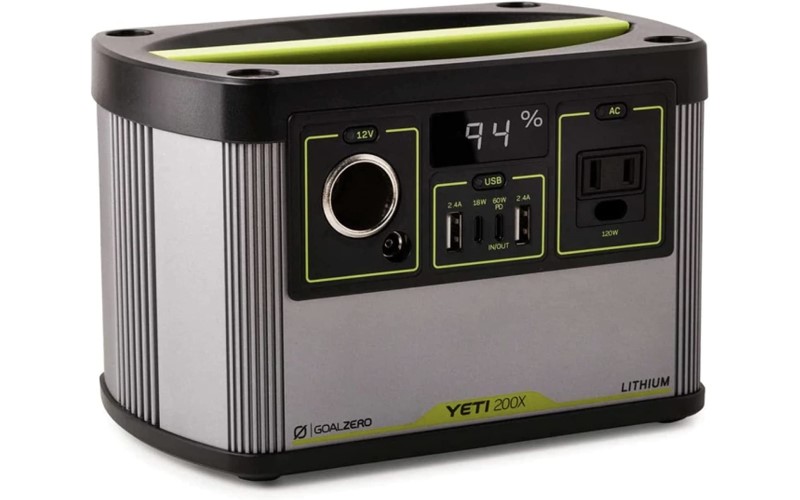
Goal Zero Yeti 200X portable power station
Compatible with solar panels
The Goal Zero Yeti 200X portable generator can be connected to solar panels, but it also has a wall plug. Its USB ports and 120-volt power outlet give you plenty of options for charging. And it runs silently.
Pros:
- Lots of charging ports
- Recharge the battery using solar panels
- Quiet while in use
Cons:
- Compatible with specicif brand panels
- Not for powering large appliances
Plugging the Goal Zero into a traditional wall outlet will power up the battery in about two hours. You can also recharge it using your car and a 12-volt adapter, but it will take longer. But using solar panels actually recharges the battery the fastest, plus its free energy. However, solar panels must be purchased separately and are expensive. Also, the Yeti is only compatible with Goal Zero panels.
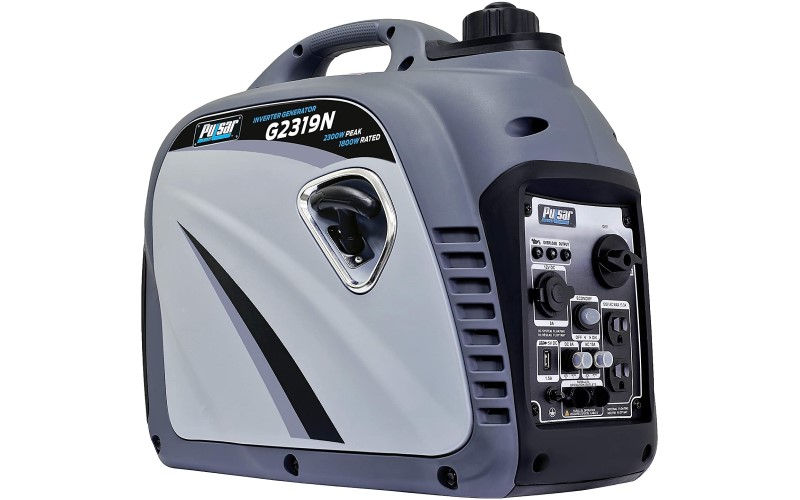
Pulsar portable gas-powered inverter generator
2300 peak watts
The Pulsar generator gives you 1,800 running watts across two 120-volt power outlets and a USB port. This inverter generator is safe to use with sensitive electronics like laptops and cell phones.
Pros:
- Works with electronics
- Over 4 hours of continual power
Cons:
- Recoil start mechinism
- Heavy when full
This gas-powered generator is smaller than others, so it doesn't need wheels to move it about. but we do recommend setting it into place before filling since it weighs around 47 pounds empty. But it only needs about 1.18 gallons of fuel to provide just under 5 hours of electricity. It includes WAVE Technology, so it's safe to use for charging sensitive electronics including laptops and cell phones. This unit has a single USB outlet and two 120V outlets. It needs to be started with a pull cord, but it’s a reliable performer.

Ryobi 150-watt powered inverter generator
Portable power option
The RYOBI 150 inverter has a smaller power output. But it's handy to have in your car or RV to charge devices when you’re out and about, or at home in a pinch.
Pros:
- Quiet
- Lightweight
- Built-in flashlight
Cons:
- Very low wattage
- Bettery costs extra
The Ryobi generator provides two USB ports and one 120-volt power outlet which all run off a single 18-volt ONE+ battery. Batteries are sold separately from the generator, which increases the overall cost. The running wattage is low at 150 watts, so you can't use the RYOBI 150 for running large appliances like air conditioners, power tools, or fridges. But the included LED flashlight hints at its true purpose as a great little power source for camping trips.
How to choose the right generator for you
Why you can trust Top Ten Reviews
When it comes to choosing the best portable generator, it’s worth deciding on a few factors first. The fuel source is one important consideration, gas and battery-powered generators are both common, and each has its own advantages. Gasoline models allow you to keep topping up the engine, but they can also be messy, noisy, and smelly. Battery-powered options are quieter than their gasoline counterparts.
The next thing to consider is the generator's actual portability. A heavy generator with a 9000-watt output isn’t actually going to be that portable, and you may need to sacrifice some power for convenience. Or, you could balance the two by choosing a model with wheels. That way you can have great power output with mobility. Generators that use a cord pull to start are often lighter but are also more difficult to start.
Reviews
Whirlpool 24" Stainless Steel AI Dishwasher Review
Napoleon TravelQ PRO285 Portable Gas Grill review
Dreame L40 Ultra Robot Vacuum Cleaner and Mop review: almost hands-free cleaning
GE Profile Smart Mixer with Auto Sense review: a powerful, thorough mixer
Echo eForce DPB-2500 review: a leaf blower as a snow removal tool?
DPAS-2100 + Pro Paddle Attachment review: a new way to remove snow this winter?
Midea MAD53109APK 5.5QT Air Fryer review: a small, simple, and highly effective option
Eureka J15 Pro Ultra Robot Vacuum review: hands-free cleaning for busy families
Wattage is the next factor to consider. When electronics startup they will use more power than they will while running, which is known as the surge or starting wattage before they settle into their running wattage. If the surge wattage is higher than the generator can handle, it will cut out. So, take a look at the rating for surge/starting and running wattage. Usually the higher the rating, the better. To calculate, determine the running wattage of all the devices you want to use simultaneously, then add on the single highest starting wattage of all the devices. This will give you a wattage number to look for in a generator.
Why trust us?
At TopTenReviews, we recommend the best products to enhance your life. As experts, we handpick products based on quality and usefulness to positively impact your life. We take our responsibility seriously — testing products, reading reviews, and sourcing knowledgeable outlets to ensure our selections are worthy of your time and money. We deliver detailed product overviews, balancing objective information with subjective opinions, so making the best choice for your home and lifestyle is as easy as possible.
Sign up to receive the latest news, reviews, buying guides and deals direct to your inbox
Sophie is Home Editor at Top Ten Reviews. Starting off her career in print journalism, Sophie then moved to digital and now specializes in lifestyle, home interiors and social media. While she has scooped awards for her journalism, Sophie likes to whip up a storm in the kitchen when she's not writing.

